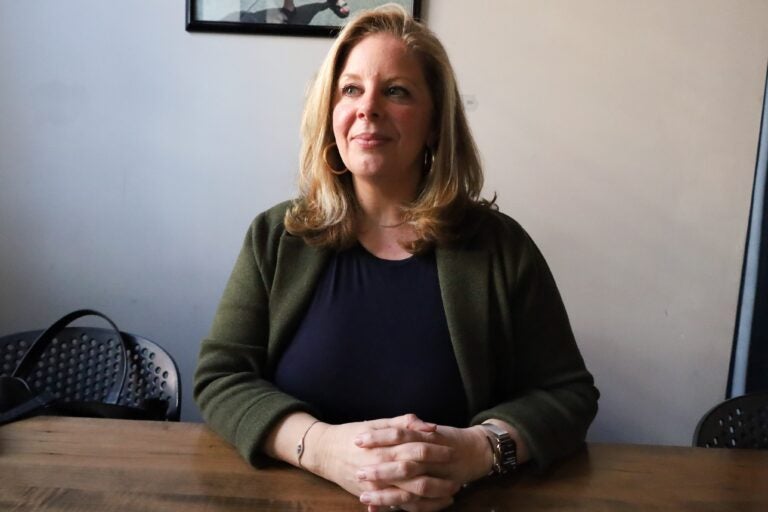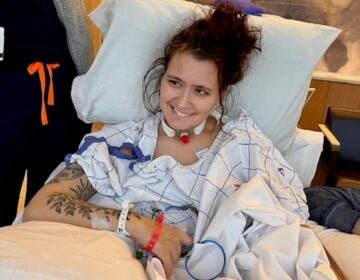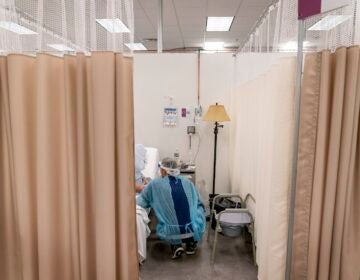Philly woman uses her experience with vestibular disorders to increase awareness and support for others
Vestibular disorders is a group of conditions that can include symptoms like dizziness, imbalance, vertigo and hearing loss.
Listen 1:53
Kristy Carabello, of Philadelphia, was diagnosed with two kinds of vestibular disorders, Meniere’s disease and vestibular migraine, after experiencing frequent and serious episodes of vertigo. She later created her own digital app, Vertige, to help her and others track vertigo and identify triggers. (Nicole Leonard/WHYY)
From Philly and the Pa. suburbs to South Jersey and Delaware, what would you like WHYY News to cover? Let us know!
The first sign something was wrong with her health was when Kristy Carabello had two bad episodes of vertigo.
“I was just sitting at home, on the sofa, on my computer and it just came about,” she said. “I got super sick and it was like, what just happened?”
Then, these intense and debilitating attacks began happening more frequently.
“For me, the world is spinning around me,” Carabello said. “A lot of times, I can’t open my eyes because you’re just so nauseous and sick to your stomach and then you’re just sick in general after that, so it knocks you out.”
She also noticed that her right ear felt unnaturally full, and she couldn’t hear as well. For months, she sought answers from allergists, ear, nose and throat specialists, audiologists and neurologists.
Finally, Carabello was diagnosed with two kinds of vestibular disorders: vestibular migraine, a neurological condition, and Meniere’s disease, “which is an inner ear disorder where the fluid in your ear fluctuates,” she said.
Carabello, who lives in Philadelphia, didn’t know much about the vestibular system, an inner-ear sensory system that sends signals to the brain and helps people maintain their balance and spatial awareness.
Vestibular disorders can cause acute or chronic dizziness, imbalance, hearing loss, vertigo and other issues. An estimated 35% of people 40 and older experience a vestibular dysfunction in their lifetime, according to national research, but may not know it.
These conditions aren’t as well-known as other chronic diseases, and people who live with them say they can feel like having an “invisible” illness or “hidden” disability. But Carabello and others are trying to change that with more awareness and resources.
“I’ve been through the worst of it and now I can help people and start talking about it,” Carabello said.
Many people don’t know much about vestibular disorders before they’re diagnosed, said Cynthia Ryan, executive director of the national Vestibular Disorders Association. The organization helps educate people on their conditions.
“And having the language, they can talk to their health care providers, talk to their employers, talk to their family and be better advocates for their health care,” she said.
This work also includes educating health care providers and specialists who treat people with symptoms of vestibular disorders, Ryan said.
“Many people struggle finding a health care provider who understands what they’re going through,” she said. “And they often have been told even by their health care providers that there’s nothing you can do for it, which isn’t true.”
Treatment for various vestibular disorders includes medication, physical therapy and lifestyle changes to manage or reduce triggers.
For Carabello, her diagnoses helped her find medications and specialty care, but she still wanted to know how to prevent her most debilitating symptom: vertigo.
So, she started tracking possible triggers, including the foods she ate, stress levels, exercise and other activities, screen time, hormones and more. At first, she did this by hand, but began to think of a way to make tracking easier.
“I actually found there were a lot of migraine tracking apps, but there weren’t any for vertigo,” Carabello said.
So, she created her own digital app. In 2023, she launched Vertige, which helps people track vertigo episodes and their possible triggers with daily entries and long-term data reports.

Carabello said she hopes it’s a tool people can use to take an active role in managing their vestibular disorders, and help others like family, friends and colleagues better understand how these conditions affect people on a daily basis.
“I remember how I felt when I was at my worst,” she said. “So, anything we can do to start to bring awareness and help people get ahead of this is going to be great.”
Today, scientists and researchers are using Carabello’s app to investigate how weather patterns and changes may affect people with vestibular disorders.
This story was produced as part of a PBS “Renegades: American Masters” grant.

Get daily updates from WHYY News!
WHYY is your source for fact-based, in-depth journalism and information. As a nonprofit organization, we rely on financial support from readers like you. Please give today.





